Cate Blanchett is co-founding a new program, Proof of Concept, with Coco Francini, Emmy-nominated producer and a partner at Dirty Films, and Dr. Stacy L. Smith, founder of Annenberg Inclusion Initiative. According to USC Annenberg, “the program’s goal is to identify the next generation of filmmaking talent whose stories promote the perspectives of women, trans, and non- binary people.”
They spoke with People and GMA3 exclusively about the new program which you can read and watch below.
Press release from USC Annenberg & Netflix
Academy Award® winner Cate Blanchett and Emmy Award nominee Coco Francini, who are partners in Dirty Films, along with Associate Professor of Communication Stacy L. Smith and the USC Annenberg Inclusion Initiative have launched the Proof of Concept Accelerator Program. Supported by Netflix, the program’s goal is to identify the next generation of filmmaking talent whose stories promote the perspectives of women, trans, and non-binary people.
According to the latest annual report from Smith and Annenberg Inclusion Initiative, 6% of directors across 1,600 top-grossing movies were women and less than one-third of all speaking characters on screen in those movies were girls, women, trans or non-binary people. This lack of inclusion behind the camera and on screen means there are limited career opportunities for women, trans, and non-binary storytellers and those who want to bring their stories to the screen.
Proof of Concept challenges the three most significant barriers these directors face as they navigate the industry: funding, mentorship, and exposure. Up to eight filmmakers will be selected for the program’s inaugural cohort. Each of these filmmakers will receive $50,000 in funding to create a short film that can serve as “proof of concept” for a feature film or television series. Throughout the process, they will receive one-on-one mentorship and guidance from industry leaders, culminating in a project showcase to spotlight their work. Participants will exit the program ready to enter the marketplace with their project and accelerate their path to larger-scale filmmaking.
“Providing tangible financial and career support for filmmakers who often get overlooked will not only give them a fantastic launchpad to success, it will also expand the future of film and television,” Blanchett said. “Dirty Films is thrilled to be a leading partner for Proof of Concept, a groundbreaking program inspired by the profound work of Dr. Stacy L. Smith and the Annenberg Inclusion Initiative in leveling the playing field. Giving genuine cause for hope is the commitment of the Netflix Fund for Creative Equity for their help in establishing this pipeline to discover and nourish the creativity and success of new voices with compelling stories.”
“Proof of Concept was designed to solve a very simple problem: audiences want to see large-scale work from filmmakers with daring and diverse perspectives, but there is not yet enough support to nurture these voices at earlier stages of their career,” Francini said. “Despite the success of films like Barbie, The Farewell, or Past Lives, it is as challenging as ever to launch audaciously authored work from new creators, particularly those who tell stories from the perspective of marginalized gender identities. Proof of Concept is an actionable step to create meaningful and sustainable opportunities for these filmmakers.”
“I could not be more thrilled to be working with marquee storytellers Cate Blanchett and Coco Francini to launch this program with the generous support of Netflix,” Smith said. “I have long wanted to see the numbers move and this accelerator will help us to find and support the next Greta Gerwig, Ava DuVernay, Chloe Zhao, Melina Matsoukas, or Lulu Wang. Led by the creative excellence of the team behind Dirty Films, I have no doubt that the Proof of Concept Accelerator is a key solution in the push toward greater inclusion in film.”
“We’re pleased to see Dr. Stacy Smith’s years of research being put into action alongside brilliant storytellers Cate Blanchett and Coco Francini,” said Bela Bajaria, chief content officer at Netflix. “We remain committed to creating opportunities like these around the world through the Netflix Fund for Creative Equity, and look forward to seeing the stories that are brought to life by this terrific team.”
More details on the program, including eligibility and application details can be found at the Proof of Concept Accelerator site. Applications will open in January 2024.
The program is supported by the Netflix Fund for Creative Equity, a dedicated effort to help train creatives for job opportunities on Netflix productions and set talent up for success in entertainment. Since its launch in 2021, Netflix has partnered with over 80 organizations in more than 35 countries.
Interview with People
In an interview with program co-founders Dr. Stacy L. Smith and Coco Francini, Cate Blanchett recalled a recent experience being the “only woman on set” of a film.
“I had assumed, because things have shifted, and we’re all talking the big talk about the way the industry has changed, that the set that I was going to walk onto would be diverse,” the actress, 54, tells PEOPLE. “I was not only the only woman in front of the camera, I was the only woman on set. My shoulders sank. I wasn’t angry, I was disappointed.”
At that moment Blanchett was reminded “you cannot be complacent” when trying to make change — and now she’s walking the talk.
In partnership with her Dirty Films co-founder Coco Francini (they run the independent film company with Blanchett’s husband of 25 years, Andrew Upton) and Dr. Stacy L. Smith, Blanchett has launched the Proof of Concept Accelerator Program at the University of Southern California in Los Angeles to support filmmaking talent whose stories promote the perspectives of women, trans and non-binary people.
“We’ve had so many moments where the achievements and the endeavors of women have been highlighted, that it makes me think we’ve moved, we’ve shifted,” she says. “Then you look at the data that Dr. Stacy has compiled with the Annenberg Inclusion Initiative, and go, ‘Things are not moving quickly enough.'”
“I think that’s what motivated all of us to try and find a really functional, turbo-powered initiative that would help, from our perspective, tackle the challenges that we see. This initiative is really, really exciting.”
While creating the program, Francini says they focused on breaking down the three major roadblocks they found women, trans and non-binary directors most often face when they’re trying to get their careers off the ground: money, mentorship and exposure.
When the application for the program (supported by Netflix’s Fund for Creative Equity) opens in January, up to eight filmmakers will be selected to receive $50,000 in funding to create a short film that can serve as “proof of concept” for a feature film or television series.
“We’ve talked a lot about money, and that’s something that women aren’t often encouraged to talk about,” says Blanchett. “When it comes to frequently marginalized voices, people feel that they don’t know how to advocate for themselves financially. This program [will help] people realize through making a short film what their feature could be like so when they take it to a studio or a streaming service or whoever, they are able to budget it, and they know what to ask for and who to ask for that money.”
Along with funding, program participants will also receive one-on-one mentorship and guidance from industry leaders, culminating in a project showcase to spotlight their work.
“They’ll receive mentorship and oversight from not only the individuals from this team, but luminaries also in the industry,” says Dr. Smith. “As Coco found out while interviewing so many women in the industry, it’s so important to have a fellowship or a cohort. We really believe that this is something that can not only be a program that accelerates movement, but be transformative to the industry as a proof of concept for that first big feature and the resources needed to make it.”
While working on their projects, Francini wants to show these filmmakers they don’t have to be put in a box.
“There are traditionally genres that women are pigeonholed into in terms of the stories that they’re telling, trans people and non-binary people as well,” she says. “We want to create opportunities for these people to direct all different kinds of films.”
Blanchett also wants to show them they can “make works at scale.”
“When I started out in the industry, the idea of a woman leading a narrative or being behind a camera was a niche experience that was somehow going to speak to a very small audience,” she says.
“In terms of distribution, it wasn’t resourced properly, so it was set up for failure in terms of not being able to reach a wider audience. So we’re interested in expanding their access to audiences at every stage, through execution, development and marketing distribution.”
In her experience, Blanchett has noticed people tend to get “risk-averse” about showing the perspectives of trans and non-binary filmmakers.
“We want to arm them with the tools to say: ‘This is not a risk. This is going to add value to you as a company and to audiences who haven’t seen something like this before,'” she says. “We’re missing an enormous creative opportunity by not diversifying. We deplore creative laziness, we deplore financial laziness, and so we should therefore deplore a lack of inclusivity.”
“Homogeneity in any industry is the death of progress and innovation,” she continues. “That’s certainly the case for the creative industries. When you walk onto a set that is homogenous, you can sort of taste the outcome. The things that breakthrough that are fresh, that have influence for the next decade, always start because someone took a risk on them.”
According to the latest annual report from Dr. Smith and her Annenberg Inclusion Initiative, only 6 percent of directors across 1,600 top-grossing movies from 2007 to 2022 were women. Less than one third of all speaking characters on screen in those movies were girls, women, trans or non-binary people.
“There’s a cumulative disadvantage for women just because of their identity, not their talent,” says Dr. Smith. “Because on every other indicator, how much they make at the box office, how well they score on Rotten Tomatoes, all other indicators are equal. So this [program] fills the missing gap financially, as well as rounding out many of the other components that emerging talent need.”
Blanchett hopes the impact of the program lives on long after its conclusion.
“There are a lot of programs which are really important and can be a leg up, but then there’s tumbleweeds after the program’s finished,” she says. “So by creating a cohort, you’re actually creating a support network of collaborators who understand what’s at stake and what’s at play. They can self-generate between each other.”
As they prepare to sort through applicants, Dr. Smith says, “We want to find the next Jennifer Kent of horror. We want to find the next Ava DuVernay of Selma. We want to find the next Greta Gerwig of Barbie. We want to find the next Gina Prince-Bythewood of The Woman King, so that we can retire this and move on to far more interesting, engaging and compelling artistic conversations.”
Adds Blanchett: “We are hoping to find things that we could not possibly have imagined.”
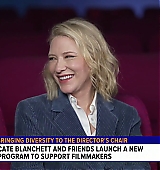
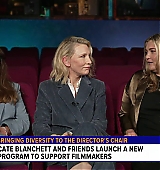


How Proof Of Concept Program Is Championing Diversity Behind The Camera
Proof of Concept program is designed to address the trifecta of challenges facing these directors: funding, mentorship, and exposure.
The inaugural Proof of Concept cohort will feature eight filmmakers selected for their potential to bring fresh, diverse narratives to the screen. Each will receive $50,000 in funding, with the financial support aimed at empowering them to create short films that can act as springboards to feature films or TV series.
Blanchett said she noticed what was missing in the industry by observing the dynamics of film-set culture, and finding that she was sometimes the only woman in front of the camera and on set.
The two-time Oscars winner says the during her 30-year career she’s “braced” and “censored” herself to accept the lack of inclusion as normal.
“You’re meant to be grateful,” she said.
Seeing the lack of resources for women in cinema led to the creation of Proof of Concept, a call to action in an industry where change isn’t happening fast enough.
“Why am I being asked to accept the lack of diversity and therefore the creative homogeneity because film doesn’t reflect the world we live in,” Blanchett said.
History has proven films directed by women can be successful. In 2021, Chloé Zhao won the Best Director Oscar for Nomadland, while Nia DaCosta found success the same year with Candyman. This year, Greta Gerwig’s Barbie has grossed $1.44 billion to date worldwide, and Celine Song’s romance drama Past Lives is a critical hit that just landed three Golden Globes nominations.
Alongside such successes, Francini explains that Proof of Concept aims to fill the gap between viewers eager for grand productions by bold and varied filmmakers, and early-career support for upcoming artists. She acknowledges the “difficulty” that remains in debuting original works by emerging creators, especially those representing marginalized gender identities.
The plan is for people to leave the program with continued support and a skill set needed to sell a movie.
“Cate and I come from a place of knowing what it takes to sell something, and there are tools involved in that process that many aren’t aware of because it’s not being taught or fostered,” Francini said. “Showing people how to build a pitch deck, and how to communicate with executives is important. It may seem trivial, but strategic practice is what’s needed in order to move forward.”
The trio says it aims to have Proof of Concept extend beyond the individual filmmakers it supports. They want it to send a message to the industry at large: change is not only necessary but possible. By investing in underrepresented voices and supporting and showcasing the work of women, trans, and non-binary filmmakers, the industry can begin to rectify the imbalances of the past and move towards a more equitable and diverse future.
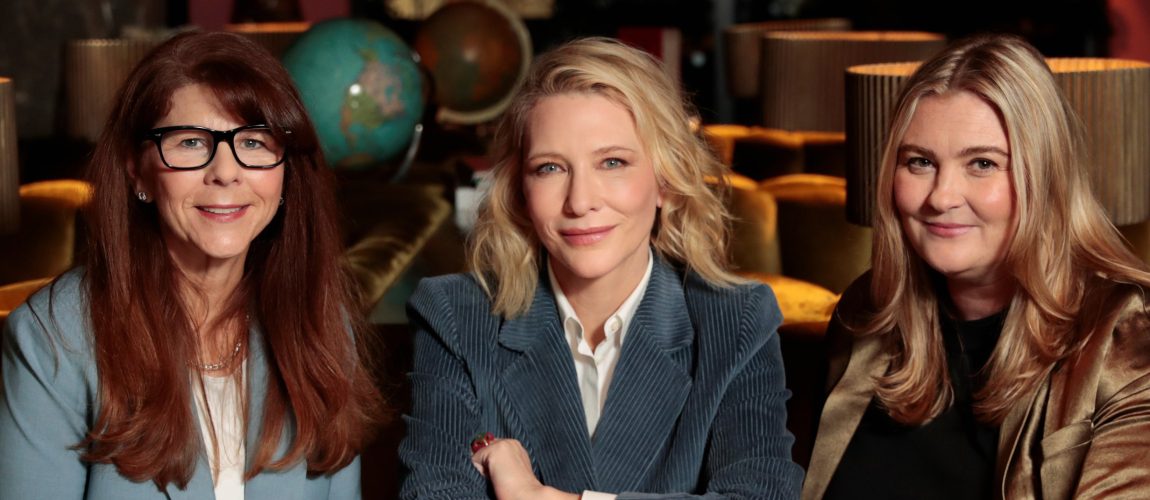
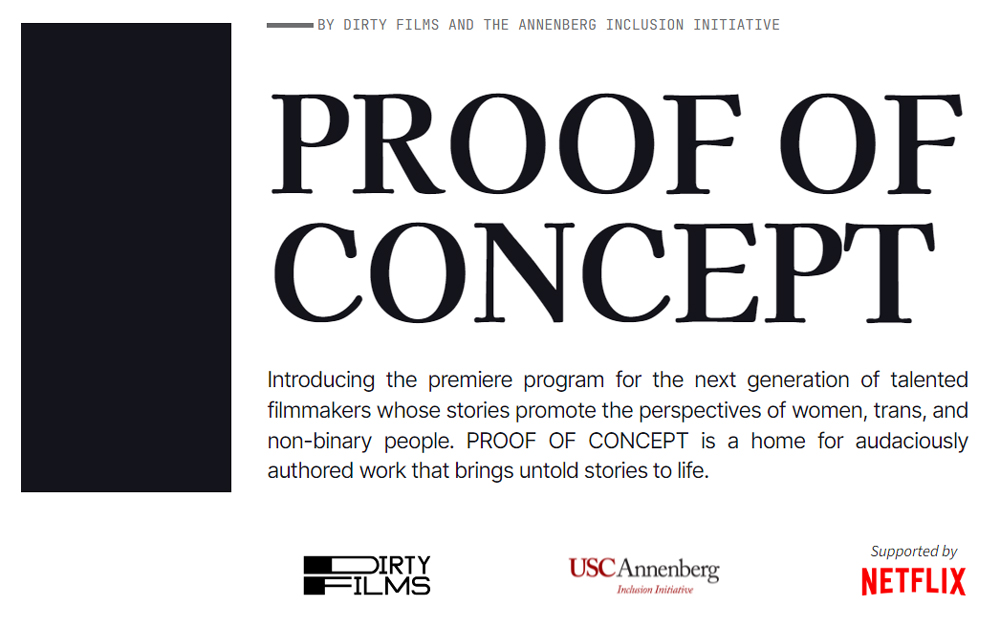
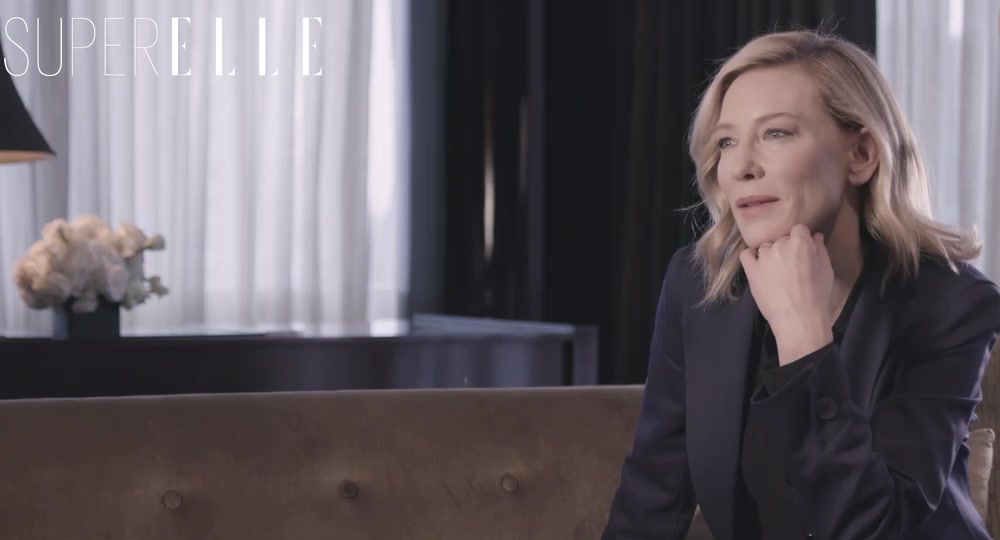
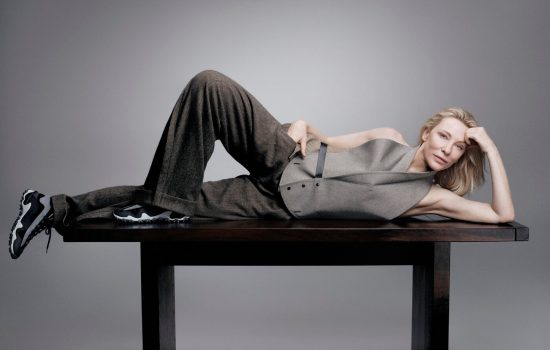
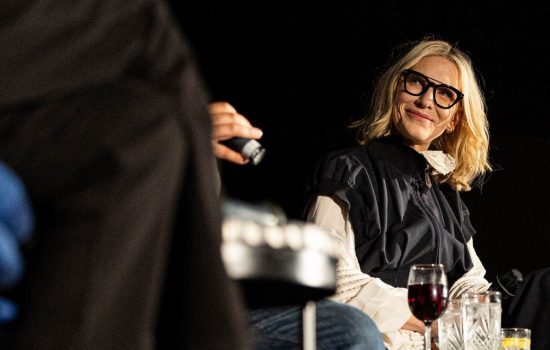

 A Manual for Cleaning Women (202?)
A Manual for Cleaning Women (202?) Father Mother Brother Sister (2025)
Father Mother Brother Sister (2025)  Black Bag (2025)
Black Bag (2025)  The Seagull (2025)
The Seagull (2025) Bozo Over Roses (2025)
Bozo Over Roses (2025) Disclaimer (2024)
Disclaimer (2024)  Rumours (2024)
Rumours (2024)  Borderlands (2024)
Borderlands (2024)  The New Boy (2023)
The New Boy (2023) 











